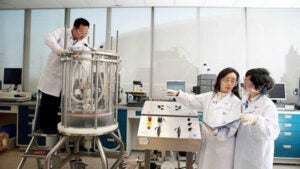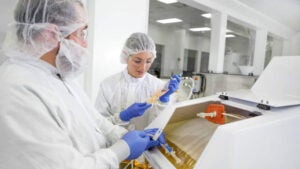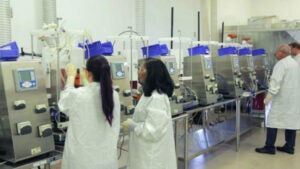Fast Trak Services

Expertise lies in knowing what needs to be done and what does not need to be done. These factors are equally important for reducing time-to-market.
GE Healthcare Life Sciences has learned from many years of experience how to minimize trial and error and get it right the first time. For nearly 30 years, the company’s Fast Trak experts have supported cell culture media and process development, as well as provided education and training to the industry.
In addition, the firm has more than a decade of experience in manufacturing biologics, having completed numerous production and current good manufacturing practices (cGMP) campaigns for Phase I and II clinical trials.
GE’s expertise encompasses process development, analytical development, process scale-up, and cGMP manufacturing across a broad range of expression systems, including mammalian, microbial and insect. It is backed by leading cell culture media formulations, single-use technologies, purification columns, systems, resin, and advanced control platforms.
Together, the Fast Trak leadership team fields a combined 300 years of industry experience.
Bridge manufacturing services
Collaborating with GE’s biomanufacturing services team is one way for biomanufacturers to expedite time to market without compromising on quality.
The firm produces drug substances for toxicology and clinical cGMP Phase I and II studies. Beyond that, the company leaves clients with the tools and know-how they need to take their process forward independently.
Collaboration speeds up processes
Senior manager at Pfizer John Coyne said: “Working closely with GE Healthcare, a small cross-company team of scientists and engineers worked with lightning speed to transfer two processes to the GE Marlborough facility for proof of concept runs. The data produced helped forge an informed decision to proceed with a single-use biologics facility in China.”
Single-use technology to cut time-to-market
Single-use technology has the potential to cut time-to-market, improve yields, and reduce water usage for improved process sustainability. Whether the client is switching to single-use or seeking a manufacturing service provider with expertise in this area, GE can help.
Setting client’s up for success
GE’s manufacturing services teams support process development, tech transfer, and manufacturing efforts in several ways to ensure the client’s success, including:
- Quality assurance (QA) guidance and project oversight
- Persons-in-plant
- Providing batch records, material specifications, bills of materials, and reports
Process development
GE help clients resolve specific biomanufacturing challenges and grasp opportunities for upstream and downstream process efficiency at every stage of development.
With the Fast Trak process development service, biomanufacturers can tap into more than 30 decades of collective knowledge. The Fast Trak team of industry-trained experts combine applications knowledge to solve bioprocessing issues and empower clients to solve them too.
Custom services
When off-the-shelf products and systems don’t meet the client’s needs, GE’s bioprocess customization services provide an extra layer of capability. The company can design a cGMP or GLP product for a specific user. Ge can also build upstream and downstream equipment tailored to a certain application. A tailored solution can have a huge positive impact on productivity.
Custom projects span upstream and downstream bioprocessing. The firm focuses on:
- Close collaboration, working with customers to fulfill their requirements.
- Combining areas of expertise, bringing together specialists in relevant fields.
- Quality and regulatory rigor, so products and equipment are designed to meet requirements.
Training and education
GE offers training and education through Fast Trak courses. The courses help manufacturers get the most from their production processes.
GE has found that to be truly effective, a course should be designed from the beginning with hands-on learning in mind. That is why the Fast Trak courses are designed around a 40:60 ratio. The company uses classroom teaching for key theoretical knowledge, but students spend the majority of the time in the lab.
Spending more time in the lab:
- Increases confidence and develops skills
- Improves familiarity with equipment
- Reduces errors
After applying design concepts in the training lab, learners can use their practical understanding to improve productivity and solve problems in real situations.
Fast Trak courses cover:
- Techniques, such as column packing
- Technologies, such as bioreactor cultivation
- Process design from scale-up to high-throughput process development







